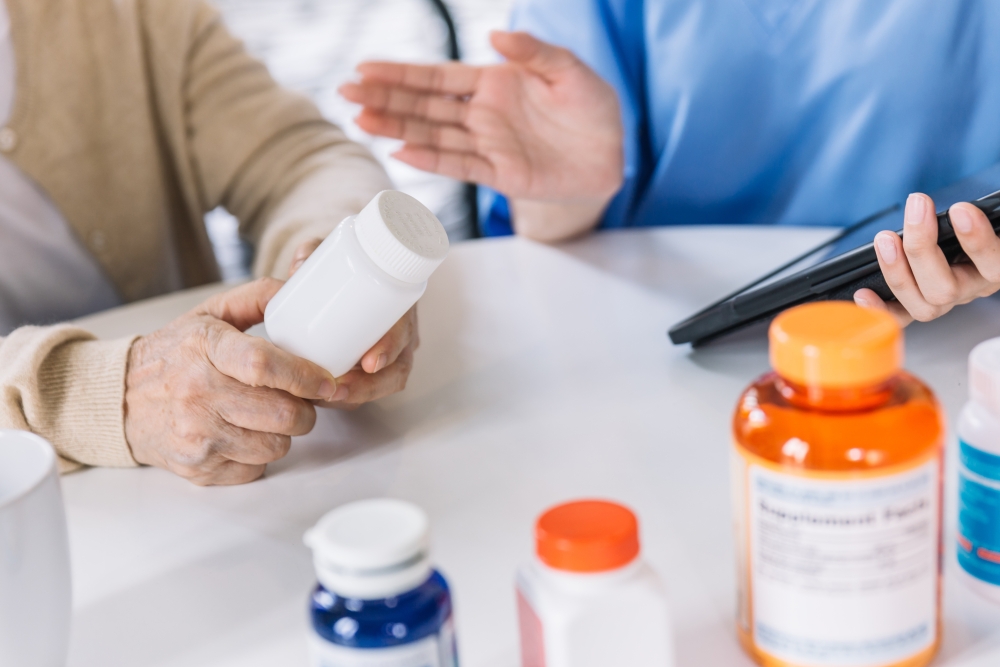Medications
Overview
For patients with cardiovascular disease (CVD), taking medication is usually a long-term commitment, perhaps lifelong. Therefore, understanding your medications and how they work is a key step in managing your CVD and preventing a first, or repeat, a cardiovascular event such as a heart attack or stroke. In fact, not adhering to a medication plan can have serious, or even fatal, consequences for many patients.
To optimize the benefits of medication, it’s extremely important that you:
- Take your medication as directed by your doctor.
- Don’t reduce the amount of medication you take without discussing it with your doctor.
- Don’t stop taking the medication until directed to do so by the same doctor who prescribed it.
- While multiple doctors may be involved in your care, cardiac-specific medications should be discontinued/held/changed only by your cardiology providers.

Know your medications
The high cost of medication and keeping track of what you take, how much to take, and when to take it can be challenging. But if you have heart disease, medication can make you feel better, and it might save your life. It’s expensive, but frequent doctor or hospital emergency room trips can cost you more in the long run.
To make it easier to face the cost and inconvenience of taking medication, consider each pill a lifesaver or a life enhancer instead of a nuisance. Ask yourself, “What does this medication do for me? How is it saving or enhancing my life?” If you don’t know, read the label. If you aren’t sure, ask your doctor or pharmacist. Once you understand, write the purpose down for future reference, give a copy to anyone involved in your care, and keep a copy with you.
Types of medication
The following table lists the most common types of medications, their purpose, and side effects used in the treatment of CVD:
|
Medication Type |
Purpose |
Possible Side Effects, Interactions, and Special Instructions |
|---|---|---|
|
ACE Inhibitors and ARBs |
To lower blood pressure and allow blood to flow more easily from the heart |
Dizziness, cough, and low blood pressure Monitor kidney and potassium levels with blood tests |
|
Antiarrhythmics |
To control an irregular heartbeat |
Side effects depend on the class of drugs Calcium channel blockers can cause headaches and ankle swelling Amiodarone can increase sensitivity to sunlight and affect eyesight It may be important to monitor thyroid function and avoid grapefruit |
|
Antiplatelet Medications |
To thin the blood and help prevent and dissolve clots in arteries and stents |
Stomach pain, headache, dizziness, and breathing difficulties Side effects are more severe in patients with asthma and allergies Take with food |
|
Aspirin |
To prevent and dissolve clots in the arteries |
Stomach upset, headaches, and drowsiness An allergic reaction could cause breathing difficulties Other severe side effects include blood in the stool or coughing up blood Take with food to reduce risk of upset stomach |
|
Beta Blockers |
To lower blood pressure and heart rate |
Dizziness, fatigue, dry mouth, slow heart rate, weight gain, erectile dysfunction, lack of libido, and cold hands and feet Side effects may be reduced if taken with food |
|
Clot Busters (Thrombolytics) |
To restore blood flow during a heart attack or stroke and to break up blood clots in the legs (deep vein thrombosis) |
Bleeding, abnormal heartbeat, and new clotting |
|
Anticoagulants |
To prevent blood clots from forming in the arteries and heart |
Bleeding, vomiting or coughing up blood, blood in stool, headaches, and dizziness Don't take aspirin unless directed by a doctor |
|
Digoxin |
To improve your heart's ability to pump blood and help to slow down an irregular heartbeat |
Nausea, vomiting, diarrhea, stomach pain, loss of appetite, unusual tiredness, and slow heartbeat Side effects are more common if too much is taken Take on an empty stomach and eat high-fiber foods, which can decrease its absorption |
|
Smoking Cessation Medication |
To make it easier to stop smoking |
Talk to your doctor to find the right fit for you |
|
Statins |
To lower your cholesterol level and reduce the risk of heart attacks and strokes |
Muscle pain, liver damage, memory loss nausea, gas, diarrhea, constipation, and rash |
|
Diuretics (Water Pills) |
To lower blood pressure |
Frequent urination, dehydration, blurred vision, fatigue, rash, and loss of appetite Monitor blood pressure and kidney function |
|
Vasodilators |
To widen the blood vessels to increase the flow of blood and lower blood pressure |
Headaches, nausea, and dizziness, especially in older people Don't drink grapefruit juice, as it may interact negatively with cold medicine |
The types of medication listed in this table aren't brand or generic names. If you’re unsure which type of medication you’re taking, ask your doctor or pharmacist or look it up in an online medication database to understand the purpose of the drug and how it will help you.